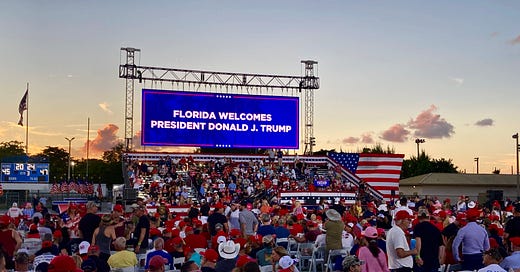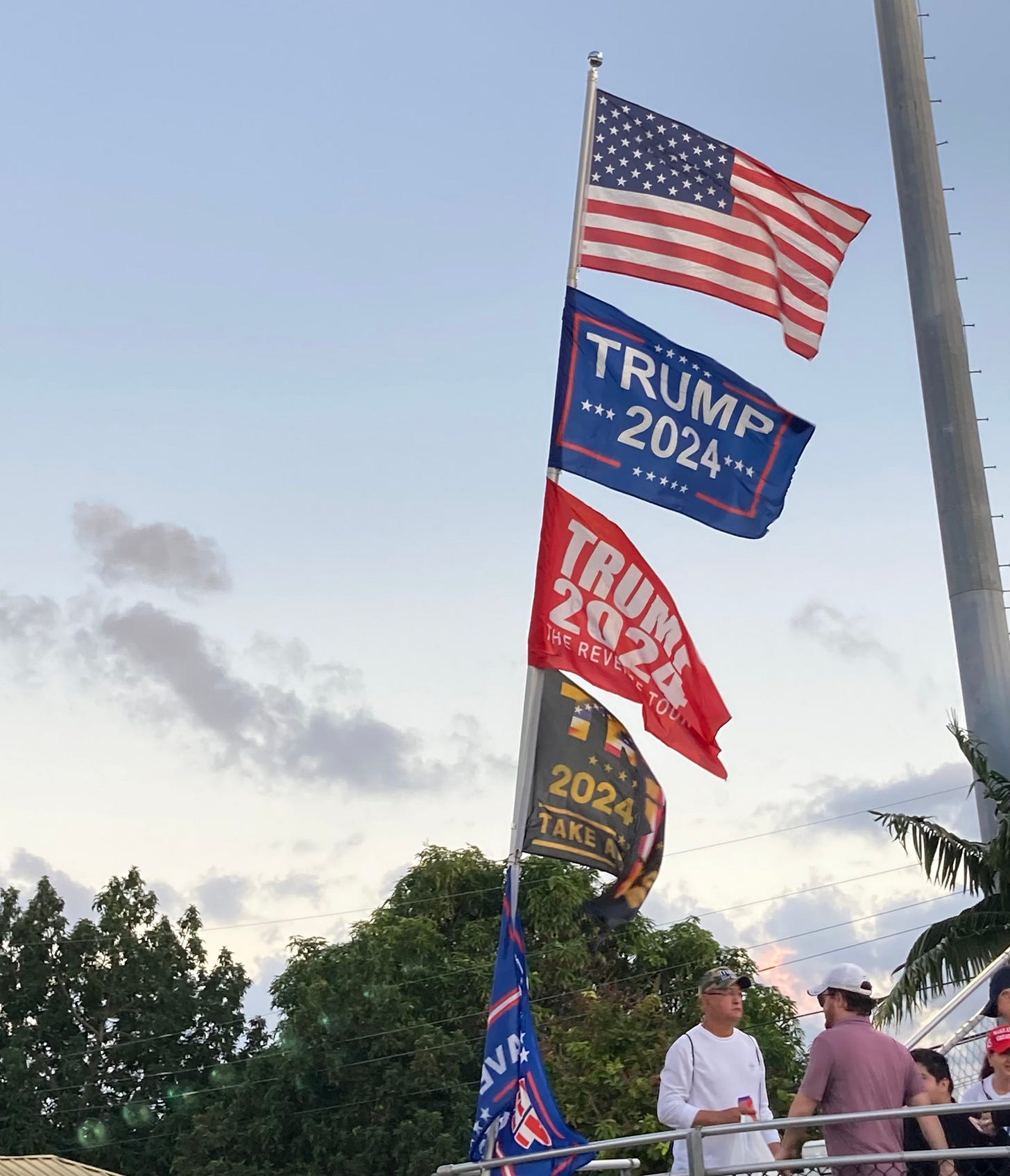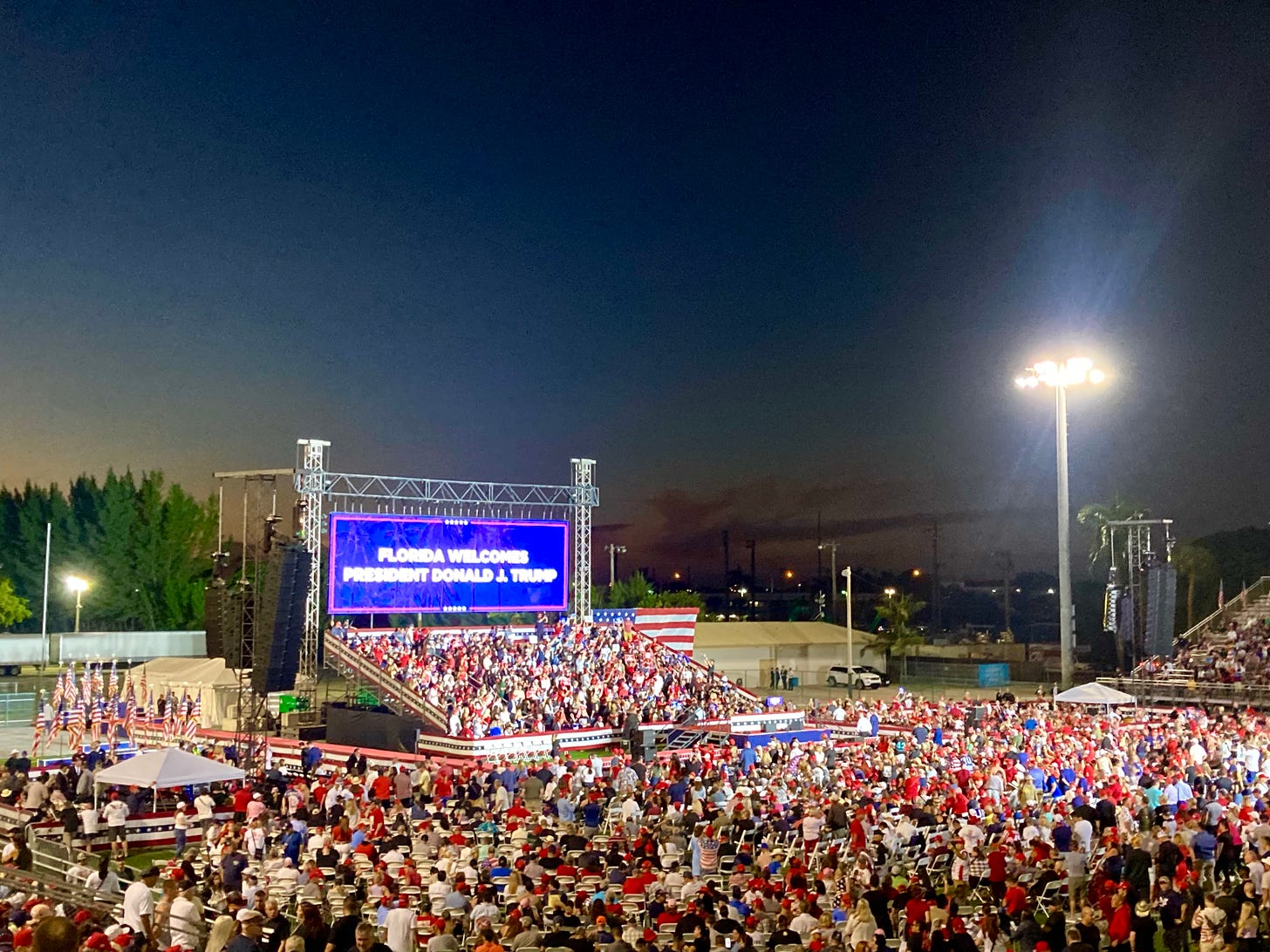Before I give my brief description of the event in Hialeah last night I want to take a pedantic detour and discuss epistemology.
Epistemology is the study of how we know things and what we can know.
I have a running theory (totally unverified by any social science data that I know of): 80% of political believers are sheep. They make decisions purely based on fuzzy emotional impulse and association. If they’re raised Republican they remain Republican for life and fill in the story haphazardly about ‘why’ they’re Republican but the real reason is that some idea or lesson imprinted on their brain long ago and they don’t have the intellectual bandwidth or wherewithal to challenge it. The good news is these people tend to be moderate and their affiliations are leavened by what we might nostalgically call ‘common sense’.
15% of believers are midwits. They tend to be more educated but they have generally absorbed incomplete or pre-digested narratives. They are more motivated and knowledgeable about the issues but much of their knowledge has been distorted and channeled by confirmation bias. There are tens of thousands of indignant Americans rallying behind the Palestinian cause right now. Most of them are Muslim, and their motivations and reasoning fall outside of my model so I ask you to set that group aside. The remainder tend to be young progressives, who lack a broad background knowledge of the region and its history and have been led by professors or activists or journalists to conflate Hamas with a movement for a Palestinian state, and to wrongly lay all civilian deaths in Gaza at the feet of Israel (knowing little about jus ad bellum or military operations or proportionality). This is an example (although I could use two dozen more) of an issue about which more knowledge actually brings you farther from a sensible position (to a certain extent). It’s a kind of ‘uncanny valley’ of political opinion-forming. From studying beliefs and believers for decades, I can say with certainty that knowledge is only consistently useful when it is applied and processed fairly. Many smart people (not brilliant, but smart) are especially good at creating reasoning or distorting data to validate their own prejudices (and there is social science data to support this) and so their education actually leads them farther afield. Ideally education would teach critical thinking and how to think, but anyone who believes that our elite colleges are teaching this now (are they deeply examining the evidence for the idea that racism is a major obstacle to black and brown Americans today? Are the considering the converse and weighing the data that it’s not? Or are they just being fed propositions? Too often it is the latter).
5% of believers are motivated and original thinkers. They’re not all high intelligence, although they are generally higher IQ than the mean. Some of them became motivated to learn about issues because of life events, or an encounter with discordant narratives. Some of them just love learning. They are suspicious of ideology and try to apply an analytical lens to questions of political and cultural import.
Naturally I consider myself part of that 5%. Whether or not my model is valid or whether I am in that independent-minded 1/20th which I’ve mentally set aside isn’t so important here. Even those people, those informed and rigorous examiners, have been challenged by the media and political landscape in the past 5 years. We increasingly have a situation in which an unmanageable volume of information is available to each citizen, and the mainstream media is distorting or ignoring salient facts and stories for cryptic reasons. I’ve already written that if you have not seriously adjusted your worldview and your information diet in the last 5 years you’ve almost certainly been left behind, whether or not you know it.
I was not a Trump supporter in 2020 and I don’t consider myself one now. (I will write my endorsement essay for the 2024 race next year, and it will be long). However, I recognize that in the past few years I’ve made a fundamental epistemological error. I assigned too much credit and fidelity to the information I was getting from the New York Times and the Economist and Facebook and YouTube. I didn’t understand (no one really did) how deeply compromised those information sources had become. I’m writing a piece about the phenomenon of systemic media bias right now but I will identify three factors in media narrative-twisting, which have all become MUCH more pronounced in the past 6-7 (and especially bad in the past 3) years:
changing incentives for media and social networking companies;
a new role for governments and non-profits in intentionally shaping the information consumed by the public (the ‘Censorship Complex’ described by Matt Taibbi and Glen Greenwald and Michael Shellenberger, et. al);
a new crop of journalists and media contributors who uniformly hail from privileged backgrounds and whose worldviews were molded by the assumptions and biases of a very distinct progressive worldview, which is hypocritical, pessimistic, and totalizing. The worldview falsely claims to be concerned with privilege and equality, it’s anti-capitalist and anti-Western and anti-normative, and it admits no realm outside the scope of its gaze. There are no separate manners or norms or institutional prerogatives or ethical dictates that lie outside or above of the worldview. The worldview is everything, and so it’s not surprising that it distorts everything these young, privileged journalists believe.
I knew these factors existed but I didn’t realize (until Musk took ownership of Twitter, and congressional testimony revealed some of the dynamics at play and, especially, many of the media’s narratives proved to be willfully false) how extensive the influence of these malign factors had become. Consequently I have been in a process of recalibrating my epistemology, and re-adjusting many of the beliefs that I absorbed from the media. Was Trump’s historic corporate and personal high-earning bracket tax cut really an economic net negative? Was Trump’s scrapping of the Obama-era Iran deal really folly which might inflame the Middle East and encourage Iranian recalcitrance? Today the best I can say is “I don’t know” (although on the second question it appears that Trump was, in fact, correct).
The rally took place in a near suburb of Miami, a formerly-working class (and now decidedly prosperous) Cuban neighborhood called Hialeah. I was dealing with sudden phone issues so I had a girlfriend send me a screenshot of the streets around the venue and used signs and dead reckoning to make the 20-mile drive from my office in Deerfield Beach. I left my workplace early and arrived in the vicinity of the rally site shortly after 5pm. The late afternoon light was quickly fading to dusk and the area around the stadium was alive: cars parked on medians, police cruisers, secret service foot patrols, booths and tables selling snacks and flags and shirts and drinks.
The notice I received upon registering for the rally asked attendees to please enter by 6:30pm, so I took that as the start time. I generally wake up before 5am these days and spend a half hour lifting and some time at the beach each morning before work. 6:30pm doesn’t feel late to me, but 8:15pm does and it was fully 8:15pm before Trump took the podium. We waited with a packed stadium (containing, I would guess, 7-8,000 people) for 3 hours. The interim was filled with speeches by the mayor of Hialeah; and a local self-made fuel distribution executive; and Kimberly Guilfoyle; and Donald Trump, Jr and Jorge Masvidal and… There were generous pauses, during which the screens showed some of Elvis’ later performances and some popular music videos from the early 1980’s. Sarah Huckabee Sanders (Trump’s former press secretary, now the governor of Arkansas) finally took the podium at 7:45pm and struggled to keep the crowd’s attention and manage their patience with a long speech about visiting troops on Christmas with then-President Trump. Clearly she was just buying time for her old boss, who by now seemed (to me) almost inappropriately tardy.
Despite the hours of listless waiting the crowd was electric as Trump’s distant form climbed out of his Suburban and slowly made his way along a red carpet to the stage. Women near me were trembling, and weeping openly. People were cheering and pumping their fists. For the dozenth time the crowd erupted in a chant: ‘U-S-A, U-S-A…’ and I wondered if such a basic and legitimate expression of homeland pride might ever be heard at Democrat events these days. Certainly a decade ago, but now… ?
I’m embarrassed to admit that 8:30pm is critically close to my regular bed time these days, so my endurance and focus was flagging by the time Trump took the podium but his speech was unremarkable. If you’re heard Trump speak to followers (and, in a sense he’s always speaking to followers, even when he’s addressing his critics or oppositional journalists) you could probably ‘mad libs’ the points: Arkansas is a great state under Huckabee Sanders, Florida is a great state. America needs a strong leader. Biden is not it. We used to call Hillary Clinton ‘crooked Hillary’ but now we call her ‘beautiful Hillary’ because the incumbent and his family are especially crooked. Immigration is a mess, the economy was great in 2019 and is beset by waste and inflation and recessionary pressures now. Trump didn’t say “beset by recessionary pressures”… I’m paraphrasing somewhat. I was less interested in the contents of Trump’s speech than I was in the event itself. Trump’s speeches are all more or less 1/3 political speech, 1/3 stand up comedy call and response, and 1/3 hypnotically familiar phrase inundation, simple and repetitive and lulling. As an aside I will say that I agree with much more of the content of Trump’s remarks than I would have in 2016 or 2020 I suspect.
The event had the air of a huge state fair, or a particularly patriotic car show. I was coming directly from work so I threw a brown jacket over my white t-shirt and slacks and I was certainly in a small minority of attendees not wearing a red hat or American colors or a political t-shirt. Most of the women were in jeans and Trump t-shirts and a significant number were in heels and dresses. There was a fairly sizeable contingent of Orthodox Jews (well, Orthodox Jewish men… I can spot an Orthodox Jewish woman from quite a distance and I saw none) in attendance. The first cluster I passed was actually near the gate… taking selfies with Lil’ Pump.
Lil’ Pump is a kind of soundcloud rapper beloved by young people (or, he was 5 years ago). His songs feature the nihilism and slurred drug- and sex-heavy “lyrics” of his generation. Style-wise: if 90’s hip hop was simple and innovative and Nas was smart and ascerbic and Eminem was virtuosic and narrative Lil Pump is… cartoonish and immature. Nevertheless, he has apparently interrupted a schedule of public rendez vous with adult film stars and acquisition of face tattoos to become informed about public policy. Or perhaps he just likes red hats. There are a few celebrities on the margins of American fame (Jorge Masvidal, a Cuban-American Welterweight UFC fighter and title contender known by the nom de guerre Street Jesus was one of the rally’s early speakers) who are publicly supportive of Trump. Bridgitte B is another one-a Spanish adult film actress who was unfortunately not in attendance. Based on the small amounts I know about these figures and many similar characters I would say their unifying feature is a sentiment of streetwise, capitalist patriotism: they love America because it allows you to more or less live how you want, and the dream of wealth is alive for all those who chase it. I doubt I would find their worldviews compelling in most respects but I find this ethic admirable and relatable and I think it’s ironic that millions of wealthy progressives would disdain this belief, despite their enjoyment of the same material opportunities and social freedoms… and more. Poor and working class Americans are generally enthusiastic about capitalism. Wealthy and educated ones are often more critical. This seems like a clear instance of higher education deranging rather than improving ideas.
I saw a LOT of American flags (and equal numbers of Trump flags), and a lot of displays of support for Israel. I saw many Orthodox Jews and many Cubans and many brown and some black people (some two dozen wore white t-shirts with “TRUMPERS ARE NOT RACIST” printed on them). I heard some general complaints about the Biden administration’s domestic performance (inflation, immigration, crime, domestic fuel production, globalist effects on American industry) which are valid and well-supported, despite what the New York Times might write. I heard more complaints about our image around the world: Biden’s weakness, NATO members not meeting their treaty-designated minimum military spending assignments, Iran, etc.
What I did not hear or see was any instance of racism, sexism, homophobia. I have written plenty about how the Left abuses those concepts as a way to tarnish and dismiss other points of views so I won’t belabor the point. Progressives often write that they wish that working class and poor Americans would get educated on the basics of public policy, and vote along class lines rather than being influenced by racism or chauvinism. They want a voting base of people (few of whom they’ve ever actually met, to be sure) who are skeptical of global conflict and who have a productive vision about the role of government in improving society.
Perhaps… just perhaps, this group already exists. Perhaps they were there, comprising the wildly cheering crowd of the Trump rally.








